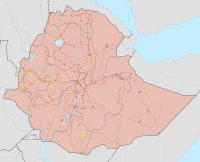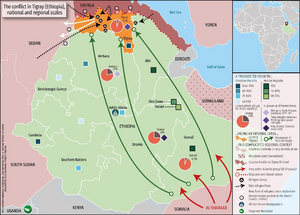Ethiopian civil conflict (2018–present) facts for kids
Quick facts for kids Civil conflict in Ethiopia (2018–present) |
|||||||||
|---|---|---|---|---|---|---|---|---|---|
| Part of the conflicts in the Horn of Africa | |||||||||
 Territorial control as of March 2023 Pro-federal government troops Ethiopian federal government and regional allies Eritrean Defence Forces Ethiopian federal government and Eritrean Defence Forces Anti-federal government rebels Tigray Defense Forces Oromo Liberation Army |
|||||||||
|
|||||||||
| Belligerents | |||||||||
|
Arms suppliers: |
|
||||||||
| Commanders and leaders | |||||||||
| Ali Diyaar Osman Abu Abdi Rahman |
|||||||||
| Units involved | |||||||||
| Unknown | |||||||||
| Casualties and losses | |||||||||
8,000 captured 2 MiG-23 lost 2 Mi-35 lost 1 C-130 lost |
2,000 captured |
800+ killed, 100 captured (Ethiopian claim) | |||||||
| Hundreds of thousands killed, millions displaced | |||||||||
The civil conflicts during the Abiy Ahmed administration is an episode of intrastate conflicts that began under the Abiy Ahmed administration. Following the 2018 dissolution of the ethnic federalist, dominant party political coalition, the Ethiopian People's Revolutionary Democratic Front, there was an increase in tensions within the country, with newly resurgent regional and ethnically based factions carrying out armed attacks on military and civilians in multiple conflicts throughout Ethiopia.
These tensions further escalated when war broke out in the Tigray region between the federal government and the regional government in November 2020. The ENDF and Eritrean Defence Forces (EDF) entered Tigray and took the capital of Mekelle. The Tigray Defense Forces retook control of most of Tigray in mid-2021 and formed an alliance with the OLA in late 2021. The alliance declared a coalition with seven smaller rebel groups, called the United Front of Ethiopian Federalist and Confederalist Forces.
Background
Emperor Menelik II, King of Shewa, who was of Amhara ancestry, through his multi-ethnic Neftenya aristocratic class seized territory in 1889 that are presently known as the Oromia, Sidama and Somali Regions. The League of Nations in 1935 reported that after the invasion of Menelik's forces into non-Abyssinian lands of Somalis, Harari, Oromo, Sidama, Shanqella etc., the inhabitants were enslaved and heavily taxed by the gebbar system leading to depopulation.
During the reign of Haile Selassie and the following Derg epoch (when Ethiopia was mostly ruled by Mengistu Haile Mariam), ethnic discrimination occurred against Afars, Tigrayans, Eritreans, Somalis and Oromos. The Amhara culture dominated throughout the eras of military and monarchic rule. As a result of neftenyas settling in the southern regions, other ethnic groups assimilated into the imperial culture by adopting the Amharic language, Orthodox Christianity, and other aristocratic cultural traits found in royal court culture. Both peasant Amhara culture and Ethiopian Empire royal court culture have heavily influenced each other; the imperial culture (which influenced and was influenced by Amhara culture) dominated throughout the eras of military and monarchic rule although Siegfried Pausewang concluded in 2005 that "the term Amhara relates in contemporary Ethiopia to two different and distinct social groups. The ethnic group of the Amhara, mostly a peasant population, is different from a mixed group of urban people coming from different ethnic background, who have adopted Amharic as a common language and identify themselves as Ethiopians". Both the Haile Selassie and the Derg government relocated numerous Amharas into southern Ethiopia where they served in government administration, courts, church and in schools, where Oromo texts were eliminated and replaced by Amharic.
Following downfall of the Derg by the Ethiopian People's Revolutionary Democratic Front (EPRDF) in 1991, Ethiopia entered a short transitional government until formal government was established in 1995. The EPRDF regime notable leader Meles Zenawi appointed as a prime minister shortly after. His rule implemented ethnic federalism to the country, leading to serious ethnic clashes and persecution against Amharas, Oromos, Somalis, and other ethnic groups people, while intensifying Tigrayan nationalism and Tigrayan ethnocratic hegemony.
Meles' government committed electoral fraud for over three consecutive cycles since 2000, and was considered an authoritarian regime by international observers. The EPRDF coalition leadership was ended after Prime Minister Abiy Ahmed came to power in 2018, and eventually dissolving the coalition in 2019, by merging most of its parties to multi-ethnic Prosperity Party. Notably, however, the Tigray People's Liberation Front (who had dominated the EPRDF coalition for 27 years) was not included.
Shortly after he became Prime Minister, Abiy began transforming the country's politics, releasing notable political prisoners from opposition parties. However, during his premiership, ethnic violence severely resurfaced and ethnic marginalization was more intense. By 2020, relations between the Abiy government and the now-ousted TPLF had deteriorated significantly, culminating in the start of the Tigray War in November of that year.


